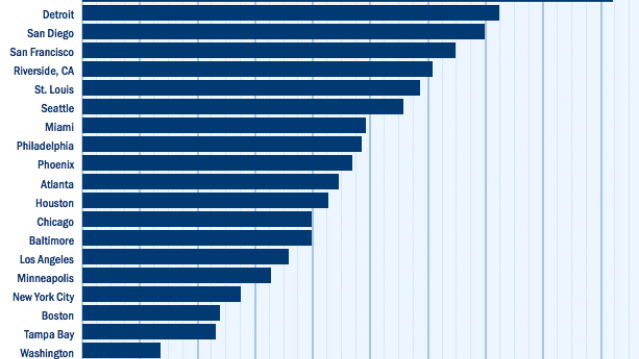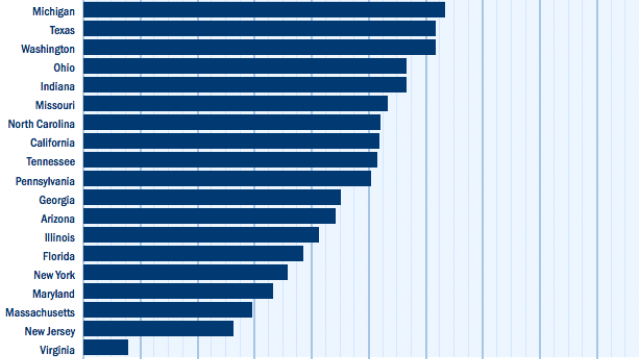How IBM Is Making Your Passwords Useless
For years, quantum computing has been hailed as a technology that could change the way the modern world works, but a long-standing technical issue has kept that potential from being realized. Now, in a paper published in the journal Nature last week, IBM scientists have taken a big step (see how I avoided the temptation to make a pun there?) toward solving that problem — and while it could represent progress toward making quatum computers real, it also could mean that current cybersecurity standards will soon be much easier to crack. In other words, your passwords could be obsolete soon.
The power of quantum computing has some obvious appeal: The increase in processing power could speed up research, especially in big data applications. Problems with large datasets, or those that need many millions (or billions, or more) of simulations to develop a working theory, would be able to be run at speeds unthinkable today. This could mean giant leaps forward in medical research, where enhanced simulations can be used to test cancer treatments or work on the development of new vaccines for ebola, HIV, malaria and the other diseases. High-level physics labs like CERN could use the extra power to increase our understanding of the way the universe at large works.
But the most immediate impact for the regular person would be in the way your private information is kept safe. Current encryption relies on massively large prime numbers to encode your sensitive information. Using combinations of large prime numbers means that anyone trying to crack such encryption needs to attempt to factor at least one of those numbers to get into encrypted data. When you buy something from, say, Amazon, the connection between your computer and Amazon is encrypted using that basic system (it's more complicated than that, but that's the rough summary). The time it would take a digital computer to calculate these factors is essentially past the heat death of the universe. (Still, this won't help you if your password is password, or monkey, or 123456. Please, people, use a password manager.)
Quantum computing, however, increases processing speed and the actual nature of the computation so significantly that it reduces that time to nearly nothing, making current encryption much less secure.
The IBM researcher that could make that happen is complicated, and it requires some background explanation. For starters, while a "traditional" computing bit can be either a 0 or a 1, a quantum computing bit can have three (or infinite, depending on how you want to interpret the concept) states. More specifically, a qubit can be 0, 1, or both.
 Up until now, the both part of that caused some problems in realizing the power of quantum computing.
Up until now, the both part of that caused some problems in realizing the power of quantum computing.
Apparently — and you'll have to take this on faith a bit, as it hurts my head to think about it — the both state can switch back to either 0 or 1 at any given point, and sometimes incorrectly, based on the logic in the programming. Think about when your phone freezes up for a second or two while you're matching tiles. This is its processor handling vast amounts of information and filtering out the operations that fail for any number of reasons, from buggy code to malware to basic electrical noise. When there are only the two binary states, this is a process that usually happens behind the scenes and quickly.
The hold-up with quantum computing up until now is that the vastly greater potential for errors has stymied attempts to identify and nullify them. One additional wrinkle in this reading quantum states is familiar to anyone with basic science fiction knowledge, or perhaps just the ailurophobics. What if the action of reading the qubit actually causes it to collapse to 0 or 1?
The very smart people at IBM think they've solved this. The actual technical explanation is involved, and well beyond my ability to fully follow, but the gist is that instead of just having the qubits arrayed in a lattice on their own, they are arranged such that neighbors essentially check each other, producing the ability to check the common read problems.
That opens the door to further quantum computing developments, including ones that will make your password a thing of the past. So, does this mean that you need to start hoarding gold? No, not yet. And hopefully before quantum computing reaches commercial, or even simply industrial/governmental levels, a better cyber security method will be in place. Or the robots will have already taken over. I for one welcome them.
The Top 10 Cities Where Small-Biz Jobs Are Growing

Small businesses have been hiring, though at a slower rate than this time last year, according to the Paychex|IHS job index.
For the 11th month in a row, Dallas’s small businesses have shown the most employment gains. The city boasts the top 12-month growth rate at 1.38 percent. Detroit (1.35 percent), San Diego (1.27 percent), Baltimore and St. Louis (both 1.13 percent) round out the top five. Houston’s recent performance is also impressive, with a rebound in growth rates over the past three months compared with declines during the rest of the year.
Related: This Is the Best Time Since the Recession to Get a Small Business Loan
Only five states saw positive gains in employment rates over the past year, and none of them increased by a full statistical point. One notable state is Michigan, which ranks second behind Wisconsin, as the state with the highest employment gains in small businesses since 2004. It also came in second for highest gains in the past year.
The index numbers used by Paychex for cities and states is based on the current small business employment rate as compared with 2004. Paychex uses 2004 as the base period to compare current gains against because it was a year of expansion for small businesses. Below 100, and the rate is lower than in 2004. Above 100, and the rate is higher than in 2004.
The charts below rank the cities and states based on their index levels.
Top Reads from The Fiscal Times
- Why McDonald’s could Suddenly Be Responsible for Millions of New Employees
- The 10 Worst States for Property Taxes
- U.S. Companies Are Dying Faster than Ever
Jeb Bush Fires Back at Trump, but Is Anyone Listening?

Despite the sizzling Summer of Trump, Jeb Bush and the rest of the Republican establishment still don’t get it.
Bush just released an 80-second video entitled “The Real Donald Trump”, as flagged by Mike Allen in his Politico Playbook note this morning, in a slick effort to attack Trump by using his own words against him. That’s a classic campaign tactic, of course, and the effort by the Bush campaign is aimed at painting the bombastic real estate mogul from New York as a fake conservative – someone whose core values and views are anathema to Republicans in Iowa, where the Real Clear Politics poll average puts Trump in the lead for the GOP Caucuses with 21.3 percent.
Related: Two New Polls Show Exactly Why Donald Trump Is Winning
Here’s a sampling from the video:
Talking to Tim Russert on Meet the Press, 1999:
- “I’ve lived in New York City and Manhattan all my life, so you know my views are a little bit different than if I lived in Iowa.”
- “I am very pro-choice. I am pro-choice in every respect.”
From a 1999 Fox News clip:
- “As far as single-payer [heathcare system], it works in Canada. It works incredibly well in Scotland.”
Talking to Wolf Blitzer on CNN:
- Who would you like representing the United States in a deal with Iran? “I think Hillary would do a good job.”
- Do you identify more as a Democrat or a Republican? “Well, you’d be shocked if I said that in many cases I probably identify more as a Democrat.”
From a 2001 Fox News clip:
- “Hillary Clinton is a terrific woman. I’m a little biased because I’ve known her for years.”
Some of the clips are 15 years old or older and show Trump for what he was: a New Yorker with unremarkable New York liberal/centrist positions on a lot of issues.
Related: Fiorina PAC: CNN and GOP Are Conspiring Against Carly
The big question for Bush and other Republican politicians in the race is: Does it matter that much where Trump once stood or even where he now stands? If it doesn’t, that is going to make taking him down even more difficult.
What Trump is selling is unvarnished authenticity to an electorate tired of politicians who try to be all things to all people. You’re not going to catch Trump courting the gun crowd by saying he likes to hunt small varmints, like the patrician Mitt Romney did. Or donning a Rocky the Squirrel hat and riding around in a tank like Mike Dukakis did in 1988 to try to show he could be a credible commander-in-chief.
Mad-as-hell voters are sick of phoniness and goofy photo ops. When will the career politicians get that?
The 5 Worst States for Drivers
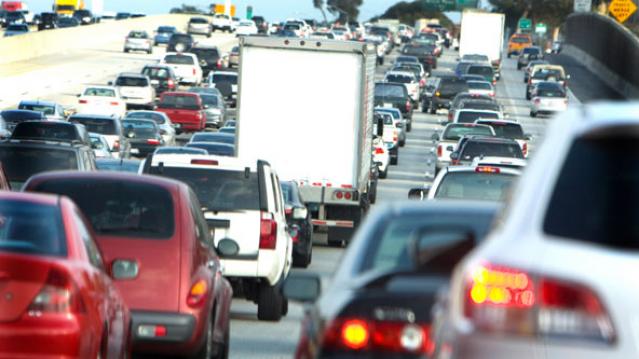
Folks in California and Washington might want to consider installing extra security devices on their cars. Bankrate says that California ranks as the worst state in the nation for car theft, with Washington not far behind. California has 431 car thefts per 100,000 people, while Washington has 407. The national average is 220.
Theft isn’t the only problem facing car owners. Bankrate also looked at data for other factors including fatal crashes, average commute times, gasoline and repair costs and insurance premiums to create a comprehensive ranking of the best and worst state for drivers.
Louisiana was named the worst state for drivers overall, mainly because of its above-average rate of fatal crashes. The Bayou State has 1.5 fatal crashes per 100 miles driven, while the national average is 1.1. Not surprisingly, it has the highest car insurance costs in the country. The state’s five-year average for a car insurance premium is $1,279, almost $300 more than the national average of $910.
Related: The Amazingly Stupid Things Smartphone Users Do While Driving
Thanks to its low gas and insurance costs, below-average theft and short commute times, Idaho ranks as the best state for drivers overall. Annual gas costs come to $733, more than $200 below the national average. Car insurance costs are typically around $656 and car thefts occur at a rate of 95 per 100,000 people. The average commute time for individuals each way is 19.5 minutes, nearly five minutes below the national average.
Here are the five best and the worst states for drivers:
5 Worst States for Drivers
1. Louisiana
2. California
3. Texas
4. Maryland
5. New Jersey
5 Best States for Drivers
1. Idaho
2. Vermont
3. Wyoming
4. Wisconsin
5. Minnesota
Top Reads From The Fiscal Times
- The 10 Safest Countries to Visit
- 6 Reasons Gas Prices Could Fall Below $2 a Gallon
- The 5 Worst Cities to Raise A Family
Google Tackles One of the Most Annoying Problems on the Internet
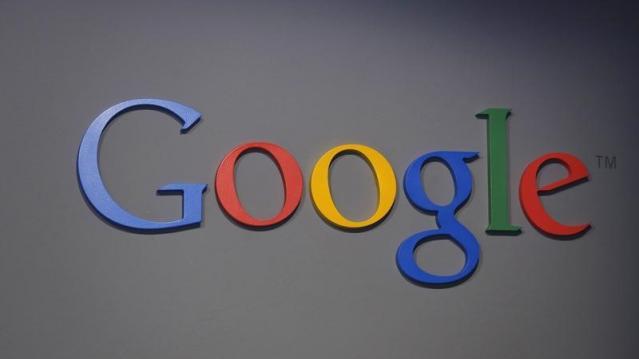
We’ve all been there: You’re surfing the Web and all of a sudden voices start coming out of nowhere. Quickly, you scramble to figure out which browser tab the autoplay media is coming from, and click around wildly trying to silence the offending intrusion.
If only there were some way to prevent such sonic irritations. According to Google, now there is.
Finally recognizing the problem of background audio from a video or ad that starts playing in a tab you’re not using, Google Chrome is now offering a solution. While Chrome already provided an icon that told you which tab was playing the audio, new versions of the browser let you mute the tabs with one click. And it gets even better.
Related: If You’re Reading This, Your Browser Could Be Hacked
Chrome will no longer automatically play media from backgrounded tabs unless you actually visit the tab. Not only does this feature reduce the annoyance of unwanted sound and trying to figure out where it’s coming from, but according to Google it will also conserve power. Chrome will consume less of your battery by playing only the videos and ads in the visible tab.
Take a (silent) bow, Google. You’ve earned it.
Top Reads From The Fiscal Times
- Air Force Brushes Off $27 Billion Accounting Error
- The 10 Worst States for Property Taxes
- If Clinton Loses Her Security Clearance, Could She Still Be President?
Facebook Hit a Mind-Boggling Milestone This Week
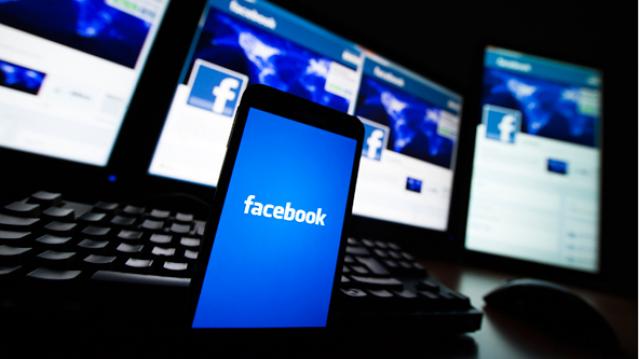
You know what’s cooler than having hundreds of millions of people use your product every day? Having a billion people use it in one day.
That’s what happened for Facebook for the first time on Monday when more than a billion people logged on to the social network, according to a post on CEO Mark Zuckerberg’s page. That’s one in seven people worldwide.
That means that a billion people potentially saw the ads that help generate the revenue that has powered Facebook’s growth. In particular, Facebook has been at the forefront of the shift toward earning ad dollars via online video, the fastest-growing digital advertising category.
Related: Will Facebook Kill the News Media or Save It?
Zuckerberg didn’t mention revenue in his post. Instead, he wrote that he is proud of the community built by the social network and said that connecting the world is making it a better place. “It brings stronger relationships with those you love, a stronger economy with more opportunities, and a stronger society that reflects all of our values.”
The milestone comes as the social network has been moving aggressively to monitor user habits and expand its product offerings to include instant messaging, photo-sharing and now a new virtual assistant. It has also explored moving into the e-wallet space and is reportedly looking into developing a credit rating system based on a user’s network.
While a billion users a day is nothing to scoff at, the company—as always—is dreaming bigger. Last month, Facebook finished construction of a drone that it hopes will provide Internet access to remote parts of the world. That way everyone everywhere can be wished a “Happy Birthday” by 300 people they haven’t spoken to in years.

